- Home
- M. L. Buchman
Drone
Drone Read online
Drone
a Miranda Chase thriller
M. L. Buchman
Sign up for M. L. Buchman’s newsletter today
and receive:
Release News
Free Short Stories
a Free book
* * *
Get your free book today. Do it now.
free-book.mlbuchman.com
About This Book
A US Air Force C-130 transport plane, bearing top secret cargo, lies shattered in the Nevada desert at Groom Lake.
China’s prototype fifth-generation jet fighter goes missing.
Far above, a US supersonic, stealth drone flies a very lethal Black Op.
The CIA, the US military command, and the secretive National Reconnaissance Office are all locked in a battle for control of the nation’s future.
Miranda Chase, the National Transportation Safety Board’s air-crash savant, lands in the center of the gathering maelstrom.
Burdened with a new team and a polarizing personality, she must connect the pieces to stay alive. And she must do it before the wreckage of her past crashes down upon her and destroys US-China relations forever.
Prologue
12 miles north and 37,000 feet above
Santa Fe, New Mexico, USA
The flight attendant stepped up to her seat—4E—which had never been her favorite on a 767-300. At least the cabin setup was in the familiar 261-seat, 2-class configuration, currently running at a seventy-three percent load capacity with a standard crew of ten and one ride-along FAA inspector in the cockpit jump seat.
“Excuse me, are you Miranda Chase?”
She nodded.
The attendant made a face that she couldn’t interpret.
A frown? Did that indicate anger?
He turned away before she could consider the possibilities and, without another word, returned to his station at the front of the cabin.
Miranda once again straightened the emergency exit plan that the flight’s vibrations kept shifting askew in its pocket.
This flight from yesterday’s meeting at LAX to today’s DC lunch meeting at the National Transportation Safety Board’s headquarters departed so early that she’d decided to spend the night in the airline’s executive lounge working on various aviation accident reports. She never slept on a flight and would have to catch up on her sleep tonight.
Miranda felt the shift as the plane turned into a modest five-degree bank to the left. The bright rays of dawn over the New Mexico desert shifted from the left-hand windows to the right side.
At due north, she heard the Rolls-Royce RB211 engines (quite a pleasant high tone compared to the Pratt & Whitney PW4000 that she always found unnerving) ease off ever so slightly, signaling a slow descent. The pilot was transitioning from an eastbound course that would be flown at an odd number of thousands of feet to a westbound one that must be flown at an even number.
The flight attendant then picked up the intercom phone and a loud squawk sounded through the cabin. Most people would be asleep and there were soft complaints and rustling down the length of the aircraft.
“We regret to inform you that there is an emergency on the ground. I repeat, there is nothing wrong with the plane. We are being routed back to Las Vegas, where we will disembark one passenger, refuel, and then continue our flight to DC. Our apologies for the inconvenience.”
There were now shouts of complaint all up and down the aisle.
The flight attendant was staring straight at her as he slammed the intercom back into its cradle with significantly greater force than was required to seat it properly.
Oh. It was her they would be disembarking. That meant there was a crash in need of an NTSB investigator—a major one if they were flying back an hour in the wrong direction.
Thankfully, she always had her site kit with her.
For some reason, her seatmate was muttering something foul. Miranda ignored it and began to prepare herself.
Only the crash mattered.
She straightened the exit plan once more. It had shifted the other way with the changing harmonic from the RB211 engines.
Chengdu, Central China
Air Force Major Wang Fan eased back on the joystick of the final prototype Shenyang J-31 jet—designed exclusively for the People’s Liberation Army Air Force. In response, China’s newest fighter jet leapt upward like a catapult’s missile from the PLAAF base in the flatlands surrounding the towering city of Chengdu.
It felt as if his crotch had just been grasped by Chen Mei-Li. Never had a woman made him feel like such a man. Fan hadn’t known that he could be taken past the ultimate peak so many times in a single night. More than once he’d half feared that his given name would come true and he would die between her legs—his fellow test pilots often teased him about his first name, Fan, meaning “mortal.”
Of course, never before had he been with a woman who cost a week’s salary. It would take at least a month to hide enough money from his insipid wife—now revealed to be so much less skilled than he’d thought—to buy another night with Mei-Li, the beautiful red gem.
Perhaps if this flight went well, he would get a promotion from Shao Xiao to Zhong Xiao—major to lieutenant colonel—and the money that came with it could simply never be revealed to his wife.
It was possible. After all, Lieutenant General Zhang Ru was his wife’s uncle. Hadn’t he lifted Fan from the officer corps to be a test pilot, and introduced Fan to his own niece and encouraged her to become his wife?
Uncle Ru personally had chosen him to be first in the Chinese Air Force to fly the new J-31—a great honor indeed.
Each successive flight in the long week of testing had built neatly on the one before. Today he had finally been given permission to truly test the J-31’s limits.
And now Uncle Ru had arranged his night in heaven with Chen Mei-Li.
Fan had felt truly immortal when he stepped up, flipped aside her robe, and entered her from behind this morning as she’d been bent over to set their breakfast table—white rice scattering wide at her surprise. With his every thrust, steamed buns had fallen upon the blue-and-white floor tiles depicting ancient gardens and elegant courtesans, each pork baozi exploding in slow motion like a tiny bomb. Forevermore, the fiery blend of ginger, sesame, and five-spice would season his memories of that purest sexual perfection.
The floor-to-ceiling window of her condo overlooked the heart of Chengdu city. Maybe those dining in the restaurant on the three-arched Anshun Bridge—that in one form or another had spanned the Jin River since before Marco Polo’s time in the thirteenth century—had gazed up to watch the glory of him taking Mei.
He hoped so.
For in the moment of that crashing release like no other, he had indeed entered Tian and become Yùdi the Jade Emperor taking Mazu the Jade Empress right up her heaven-perfect ass. He hadn’t been Wang the prince (as his surname meant) nor even king—he’d been a god.
For the gift of last night alone, he would do anything his uncle asked.
As the first Air Force pilot to fly the J-31 Sŭn, Gyrfalcon in the English that Uncle kept pushing him to learn, he would also have a pilot’s bragging rights for a long time to come. That too he owed to Honorable Uncle Ru.
The twin Chinese-made WS-13E engines delivered 200 kN, over 46,000 pounds of thrust, all driven straight into his aching member as a single roar of glory. The sixteen-meter-long fifth-generation fighter jet leapt for the heavens. It was only the fourth fifth-gen jet fighter in the world—and personally he felt Russia’s Sukhoi Su-57 was overrated. Besides, the Russian jet was still no more than a prototype, so the J-31 was the third of the new breed (he didn’t count the J-20, even though it had flown first, because with the arrival of J-31, the two-year-old jet was already obsolete).
; The two American fifth-gen aircraft were, sadly, very impressive. Now it was time to put them in their place.
The Gyrfalcon looked ungainly on the ground, more wing than plane. The shapes were all wrong when compared with the PLAAF’s other aircraft. But like the American F-35 Lightning that had been the inspiration for the superior Chinese engineers, its looks didn’t matter. It did indeed fly like its namesake, the largest of all falcons.
“Crossing five thousand meters, Mach 0.9. All systems nominal,” he continued his running report. He wouldn’t radio it in, because the foul Americans would be listening with their satellites even here in Chengdu, a thousand kilometers from any border. It was also why they were testing here rather than in Shenyang so close to the American listening posts in South Korea and Japan.
Instead of broadcasting back to base, he was to keep a running commentary of the test flight for the internal cockpit recorder. All of the sensors attached for this test flight would record far more information than he could ever grunt out against the brutal g-forces, but they wanted him to make the verbal recording anyway.
No, Uncle Ru had wanted that. And he was the one who had ordered radio silence despite the advanced encryption systems on his radio.
Why?
Think, Fan. Think like the leader Uncle Ru is grooming you to be.
Ah!
His silence would be so that no other commander could get any information ahead of Uncle Ru.
He was a very wise man and Fan still had much to learn from him. Fan would capture as much as he could, then make sure the tape was delivered only into his uncle’s hands.
“Flight is smooth,” at least compared to the Russian RD-93 engines with fifteen percent less power that had been in the prototypes.
The J-31 didn’t offer the stable ride rumored on the ever-so-similar American F-35 Lightning II, but it was the first production model delivered to the People’s Liberation Army Air Force, and for now, the seventy-million-dollar aircraft was all his.
“Impressively clean transition through Mach 1.” Normally the transition was a hard shake, like taking his CFMoto 650 motorcycle down an untended dirt road. This transition was more like the way he’d left Chen Mei-Li—still sprawled facedown on the breakfast table and gasping beneath the tangled swirl of her long, thick hair from the pleasure he’d given her, unable to rouse herself after his final shuddering release.
He detailed the differences from the Shenyang J-16 (copied from the Russian Sukhoi Su-35—with all of its engine problems that had almost killed him in testing) and the Chengdu J-20 (China’s first homegrown supersonic stealth aircraft—except for some “acquired” details from the American’s own stealth jet program).
Every single time he broke the sound barrier, it amazed him how noisy it was to fly beyond the transition. The arrowed tip of the jet’s nose cracked the air, which the hard chines of the stealth hull split into sections for smoother supersonic flow. The roar of the mighty engines, rather than being left far behind, was transmitted through the hull and couldn’t be outrun.
“Mach 1.5 at ten thousand meters. Preparing for agility tests.” Chen Mei-Li had grown up inside the state-sponsored gymnast program for eighteen years. Now too old to compete at twenty-one, she had brought her lithe form and all of that incredible agility to the bedroom.
The jet felt just as responsive, and he was just entering his prime.
The J-31’s design was primarily for air-to-air combat. Intended for lower altitudes than the bombers, it delivered exceptional maneuverability even at supersonic speeds.
He started with a simple twist—flying in a straight line and rolling the aircraft sideways wing over wing. S-turns and loops became second nature as he learned the feel of the jet’s behavior at supersonic speeds.
He finally aimed straight up and opened the afterburners wide. The jet drove into the sky until there wasn’t enough air for its engines to push against. He gradually slowed until, for an instant, he hung suspended with his momentum wrung dry, perfectly balanced: twenty kilometers into the sky on 46,000 pounds of thrust.
He held out a fist with only his pinkie finger raised toward the satellites that circled in space.
“Your dick is smaller than this, America!”
He half hoped that their cameras were powerful enough to see his gesture. They knew nothing of the meaning of power.
Maybe he would quietly remove some funds from his private savings account and celebrate this flight in Chen Mei-Li’s arms. He’d tell his wife he was needed at the base for debriefing. Or maybe he would just take his wife as hard as he had Mei-Li this morning—until she too cried out in unison with him at such intense pleasure that it was almost pain.
Finally toppling, the jet plunged downward, ramming back into the thicker atmosphere. At Mach 1.7, nearing the aircraft’s top speed, he leveled out close above the vast patchwork pools of Sichuan Basin rice farms. He imagined the cracking sonic boom rolling over farmers and their wives as the newest jewel of the PLAAF rushed by so close overhead. Perhaps the sheer power of the Gyrfalcon would cause the farmers’ daughters to orgasm at his passage.
Fan carved a hard turn and raced into the foothills of the Hengduan Mountain Range. They started abruptly to the west of Chengdu, building rapidly until they crested over seven thousand meters in the fearsome Gongga Shan. Far taller than any puny peak in North America, it rose only fifteen hundred meters less than mighty Everest.
The next stage of the test was to ease deeper and deeper into those valleys and gorges to test the jet’s agility against the real world. If India became an enemy rather than a tenuous ally, the battle could well occur in the Himalayas.
Low-level high-speed flight was the greatest adrenaline ride there was. He flung himself into the testing range, rattling the mountains themselves with his flight. An area covering thousands of square kilometers had been cleared of indigenous hill tribes and it was strictly for pilots to test new aircraft to the limits.
Rumors said that the American pilots didn’t need to touch the controls. That they could steer their flight with simple motions of eyes and head. Where was the fun in that? Wang Fan could feel the Gyrfalcon vibrate and shudder just like a woman as it submitted to his commands.
Slewing around a peak that rose a thousand meters above him, he volleyed hard from right to left to avoid the next. At eighteen hundred kilometers an hour, he covered a kilometer every two seconds. The peaks of the Hengduan Range crowded very close together at that speed.
Unable to fully catch his breath despite the pressure suit that compressed his legs and lower torso to force blood to reach his brain, he stopped his audio narration and left the instrumentation to record his actions. Uncle Ru had been a great pilot in his day. He would understand.
Fan raced into the Daxue Range, the highest part of the Hengduan. How easy would it be to climb over that last snowy crest onto the Tibetan Plateau and at long last fully subjugate those rebellious primitives with a fleet of jets like this one?
Not on today’s planned mission, but someday he’d take them down just as he had taken—
Close by the icy edifice of mighty Gongga Shan, so proud in her glacier-shrouded glory, a shadow fell over his cockpit. One moment the sun had been shining strong from the southeast, then it had blinked out.
He twisted to look aloft. A needle-shaped plane with a broad delta wing blocked the sun. The heat of anger flashed through him. No one was supposed to be using the test range other than himself. Who dared presume?
Mottled gray, it had an unusually long nose spike that must help crack the supersonic air apart. Smooth lines sleeker than even the finest woman.
The fuselage was too slender to hold a pilot.
It must be a drone!
It certainly wasn’t AVIC. The Aviation Industry Corporation of China might be one of the largest companies in the world—one tiny division manufactured the magnificent J-31 Gyrfalcon—but he knew their drones. Unless it was some other division of AVIC trying to show him up? No. Chi
na’s first supersonic drone, Dark Sword, was still in the early stages of development.
And the mockup didn’t look like this one at all.
The same fifteen-meter length as his jet but it was no configuration he’d ever seen before.
He held his heading until he was close enough to the glaciers of Gongga Shan to see down into individual crevasses. He slammed aside at the last moment, hoping that the drone would overfly its course into the mountainside. No such luck. It eased in closer until it flew directly above his head. Less than twenty meters away, it seemed to fill the sky.
Flipping his KLJ-7A radar from beyond-visual-range to close-in mode revealed…nothing. Impossibly, though he was close enough to read the markings—if there had been any—it barely registered as more than a patch of turbulent air. Its stealth was already a generation or more ahead of the J-31’s.
Nothing he tried could move it from its position directly above his cockpit. He slammed through maneuvers that he didn’t know he had in him: twists, rolls, and aborted dives.
The J-31 behaved magnificently.
But the drone mirrored his moves with unreal perfection.
At first he thought it was simply locked on to his aircraft for guidance. Except there were moments when it made small, unpredictable adjustments that meant somewhere there was a pilot in active control—a pilot with reaction times like none he’d ever seen in an entire career of dogfights. Fan had made test pilot because of his own exceptional reaction speed, but he couldn’t match the drone’s pilot.
And for the first time since Mei-Li had heated his blood until he’d thought it might turn to steam, he felt a cold chill.
Uncle Ru must be told of this, but the radio returned nothing except static when he ignored orders and tried it. The drone was blocking his transmissions, which wasn’t supposed to be possible.

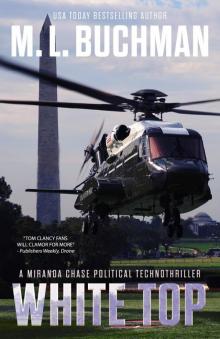 White Top
White Top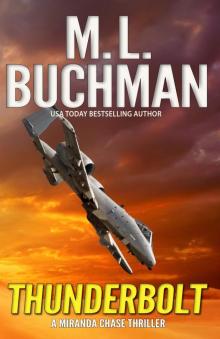 Thunderbolt
Thunderbolt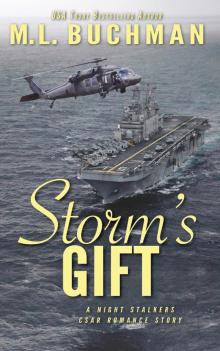 Storm's Gift
Storm's Gift The Complete Delta Force Shooters
The Complete Delta Force Shooters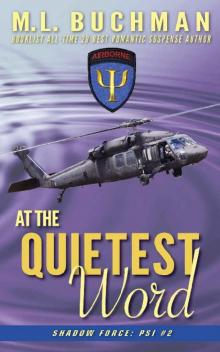 At the Quietest Word (Shadowforce: Psi Book 2)
At the Quietest Word (Shadowforce: Psi Book 2)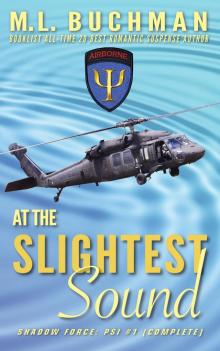 At the Slightest Sound
At the Slightest Sound Dilya's Christmas Challenge
Dilya's Christmas Challenge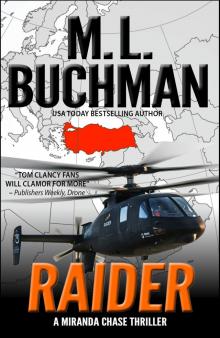 Raider
Raider Havoc
Havoc Carrying the Heart's Load
Carrying the Heart's Load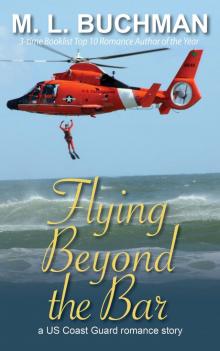 Flying Beyond the Bar
Flying Beyond the Bar Firelights of Christmas
Firelights of Christmas Where Dreams Are Well Done
Where Dreams Are Well Done Nathan's Big Sky
Nathan's Big Sky Heart of a Russian Bear Dog
Heart of a Russian Bear Dog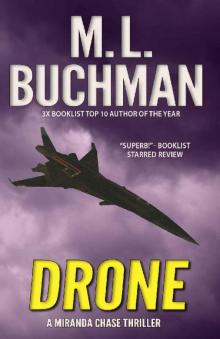 Drone: an NTSB / military technothriller (Miranda Chase Book 1)
Drone: an NTSB / military technothriller (Miranda Chase Book 1) Flower of Destiny
Flower of Destiny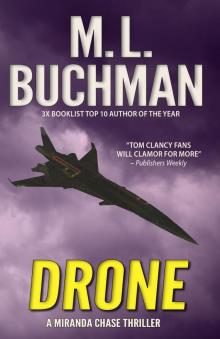 Drone
Drone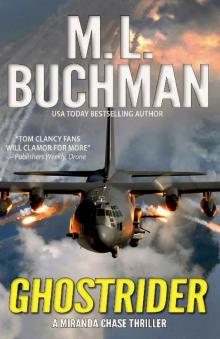 Ghostrider: an NTSB-military technothriller (Miranda Chase Book 4)
Ghostrider: an NTSB-military technothriller (Miranda Chase Book 4)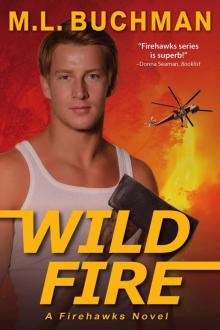 Wild Fire
Wild Fire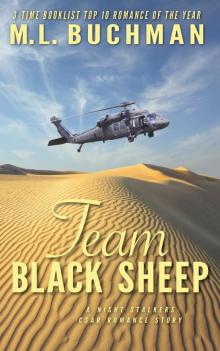 Team Black Sheep
Team Black Sheep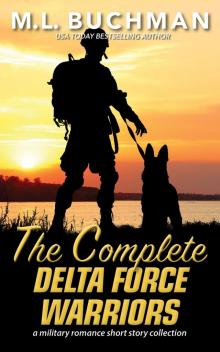 The Complete Delta Force Warriors
The Complete Delta Force Warriors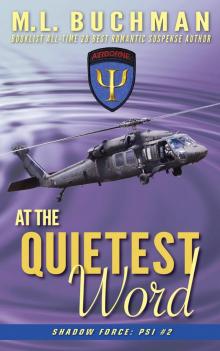 At the Quietest Word
At the Quietest Word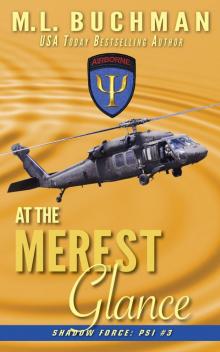 At the Merest Glance
At the Merest Glance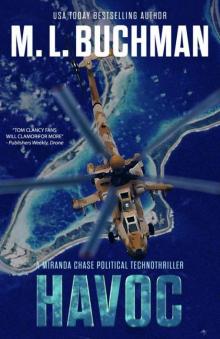 Havoc: a political technothriller (Miranda Chase Book 7)
Havoc: a political technothriller (Miranda Chase Book 7)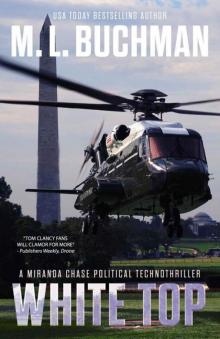 White Top: a political technothriller (Miranda Chase Book 8)
White Top: a political technothriller (Miranda Chase Book 8)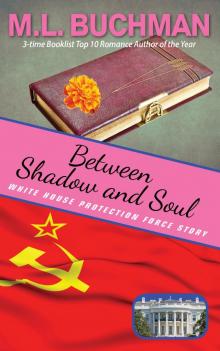 Between Shadow and Soul
Between Shadow and Soul Island Christmas
Island Christmas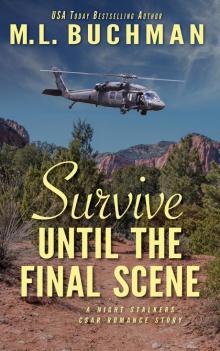 Survive Until the Final Scene
Survive Until the Final Scene Midnight Trust
Midnight Trust Return to Eagle Cove
Return to Eagle Cove Where Dreams Reside
Where Dreams Reside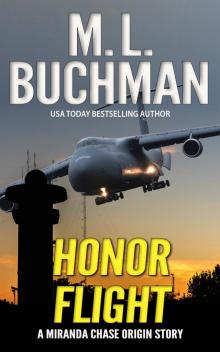 Honor Flight
Honor Flight Where Dreams Are Sewn
Where Dreams Are Sewn The Complete Hotshots
The Complete Hotshots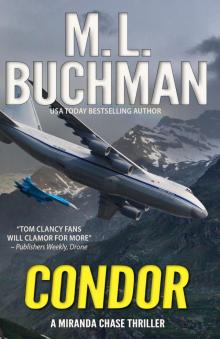 Condor
Condor I Own the Dawn
I Own the Dawn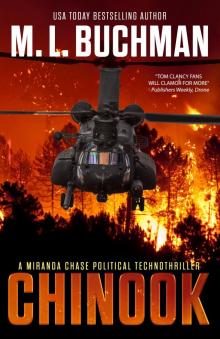 Chinook
Chinook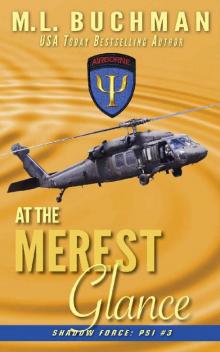 At the Merest Glance: a military paranormal romance (Shadowforce: Psi Book 3)
At the Merest Glance: a military paranormal romance (Shadowforce: Psi Book 3) Since the First Day
Since the First Day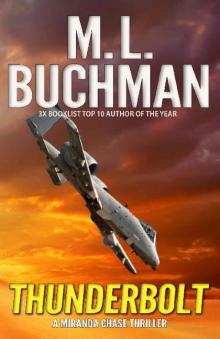 Thunderbolt: an NTSB / military technothriller (Miranda Chase Book 2)
Thunderbolt: an NTSB / military technothriller (Miranda Chase Book 2) For Her Dark Eyes Only
For Her Dark Eyes Only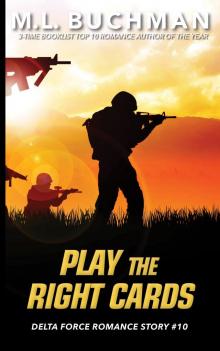 Play the Right Cards
Play the Right Cards Lost Love Found in Eagle Cove
Lost Love Found in Eagle Cove Big Sky Ever After: a Montana Romance Duet
Big Sky Ever After: a Montana Romance Duet Keepsake for Eagle Cove
Keepsake for Eagle Cove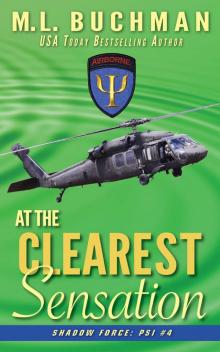 At the Clearest Sensation
At the Clearest Sensation The Ides of Matt 2015
The Ides of Matt 2015 When They Just Know
When They Just Know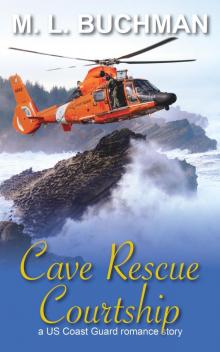 Cave Rescue Courtship
Cave Rescue Courtship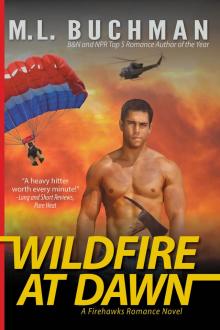 Wildfire at Dawn
Wildfire at Dawn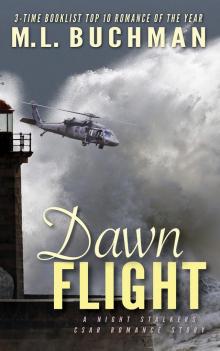 Dawn Flight
Dawn Flight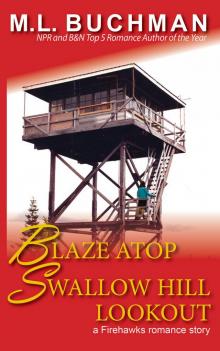 Blaze Atop Swallow Hill Lookout
Blaze Atop Swallow Hill Lookout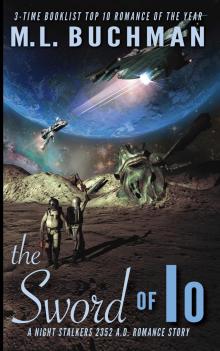 The Sword of Io
The Sword of Io Christmas at Steel Beach
Christmas at Steel Beach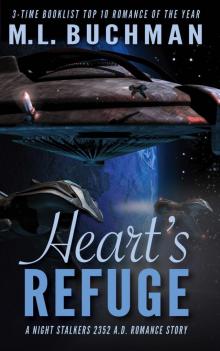 Heart's Refuge
Heart's Refuge By Break of Day (The Night Stalkers)
By Break of Day (The Night Stalkers) Kee's Wedding
Kee's Wedding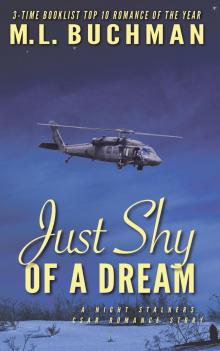 Just Shy of a Dream
Just Shy of a Dream Path of Love
Path of Love Ghost of Willow's Past
Ghost of Willow's Past Flash of Fire
Flash of Fire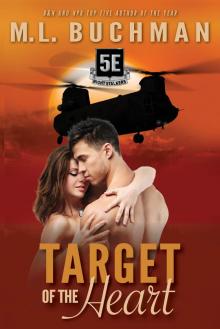 Target of the Heart
Target of the Heart Sound of Her Warrior Heart
Sound of Her Warrior Heart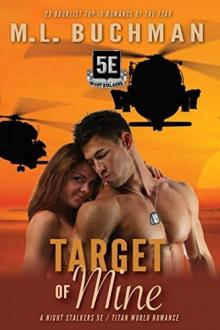 Target of Mine: The Night Stalkers 5E (Titan World Book 2)
Target of Mine: The Night Stalkers 5E (Titan World Book 2) The Complete Where Dreams
The Complete Where Dreams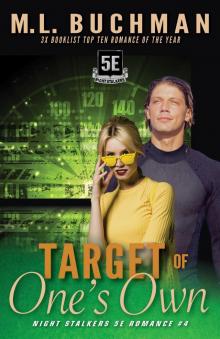 Target of One's Own
Target of One's Own For All Their Days
For All Their Days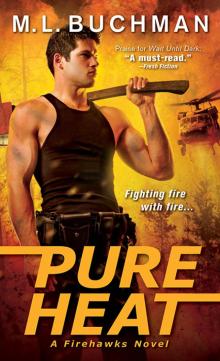 Pure Heat
Pure Heat Love's Second Chance
Love's Second Chance Target Engaged
Target Engaged Bring On the Dusk
Bring On the Dusk Wait Until Dark (The Night Stalkers)
Wait Until Dark (The Night Stalkers) Big Sky, Loyal Heart
Big Sky, Loyal Heart Welcome at Henderson's Ranch
Welcome at Henderson's Ranch Damien's Christmas
Damien's Christmas Flight to Fight
Flight to Fight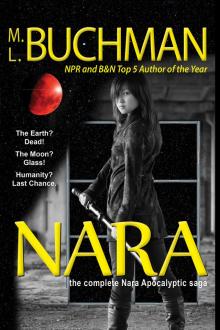 Nara
Nara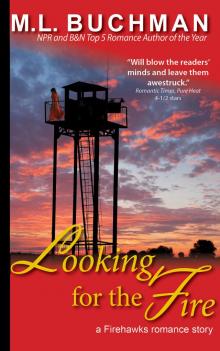 Looking for the Fire
Looking for the Fire Love Behind the Lines
Love Behind the Lines Peter's Christmas
Peter's Christmas In the Weeds
In the Weeds Christmas at Henderson's Ranch
Christmas at Henderson's Ranch They'd Most Certainly Be Flying
They'd Most Certainly Be Flying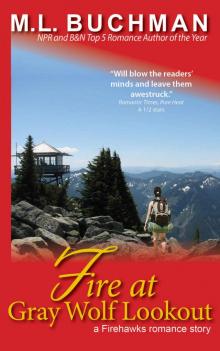 Fire at Gray Wolf Lookout (Firehawks Book 8)
Fire at Gray Wolf Lookout (Firehawks Book 8) Wildfire on the Skagit (Firehawks Book 9)
Wildfire on the Skagit (Firehawks Book 9)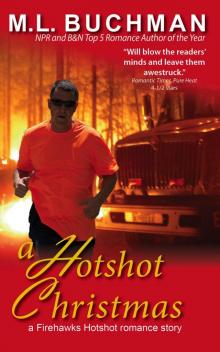 A Hotshot Christmas
A Hotshot Christmas Off the Leash
Off the Leash Where Dreams Books 1-3
Where Dreams Books 1-3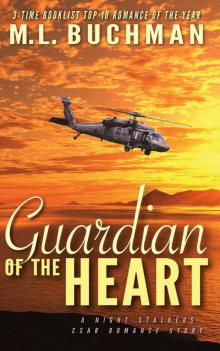 Guardian of the Heart
Guardian of the Heart The Ides of Matt 2017
The Ides of Matt 2017 Where Dreams Unfold
Where Dreams Unfold Twice the Heat
Twice the Heat Wild Justice (Delta Force Book 3)
Wild Justice (Delta Force Book 3) Flying Over the Waves
Flying Over the Waves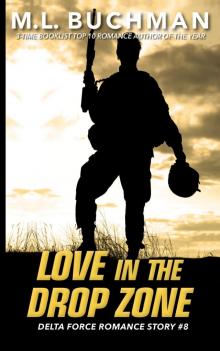 Love in the Drop Zone
Love in the Drop Zone I Own the Dawn: The Night Stalkers
I Own the Dawn: The Night Stalkers What the Heart Holds Safe (Delta Force Book 4)
What the Heart Holds Safe (Delta Force Book 4) The Christmas Lights Objective
The Christmas Lights Objective Road to the Fire's Heart
Road to the Fire's Heart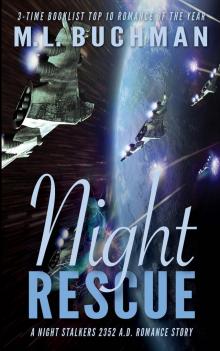 Night Rescue
Night Rescue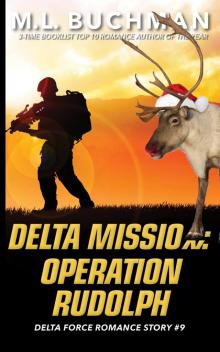 Delta Mission: Operation Rudolph
Delta Mission: Operation Rudolph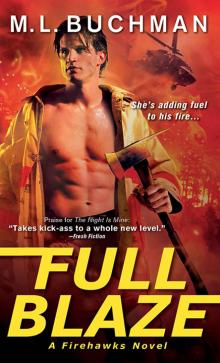 Full Blaze
Full Blaze Night Is Mine
Night Is Mine Lightning Strike to the Heart
Lightning Strike to the Heart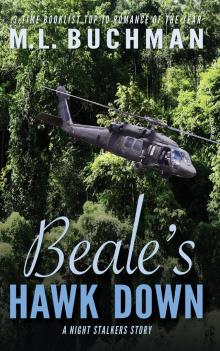 Beale's Hawk Down
Beale's Hawk Down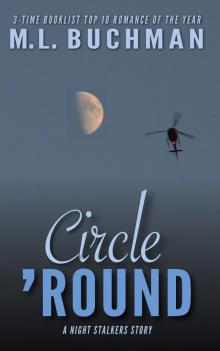 Circle 'Round
Circle 'Round Cookbook from Hell Reheated
Cookbook from Hell Reheated Zachary's Christmas
Zachary's Christmas Reaching Out at Henderson's Ranch
Reaching Out at Henderson's Ranch Fire Light Fire Bright
Fire Light Fire Bright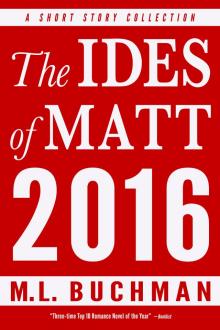 The Ides of Matt 2016
The Ides of Matt 2016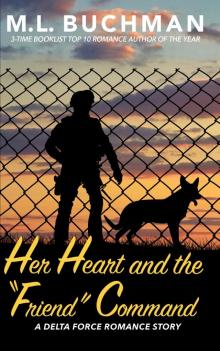 Her Heart and the Friend Command
Her Heart and the Friend Command On Your Mark
On Your Mark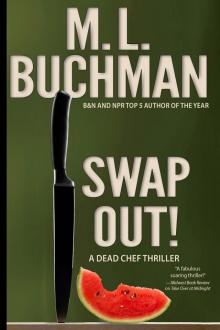 Swap Out!
Swap Out! Heart of the Cotswolds: England
Heart of the Cotswolds: England The Phoenix Agency_The Sum Is Greater
The Phoenix Agency_The Sum Is Greater Wildfire at Larch Creek
Wildfire at Larch Creek Target Lock On Love
Target Lock On Love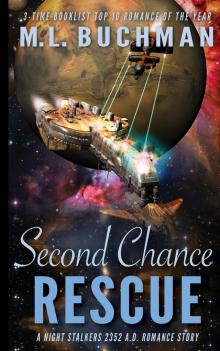 Second Chance Rescue
Second Chance Rescue Where Dreams Are Written
Where Dreams Are Written First Day, Every Day
First Day, Every Day Christmas at Peleliu Cove
Christmas at Peleliu Cove Heart Strike
Heart Strike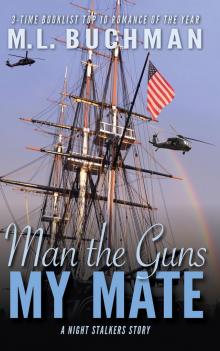 Man the Guns, My Mate
Man the Guns, My Mate Emily's Wedding
Emily's Wedding Daniel's Christmas
Daniel's Christmas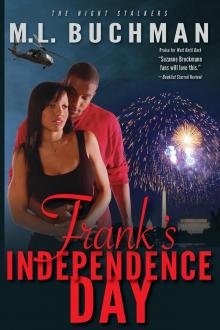 Frank's Independence Day
Frank's Independence Day The Phoenix Agency: The Sum Is Greater (Kindle Worlds Novella)
The Phoenix Agency: The Sum Is Greater (Kindle Worlds Novella)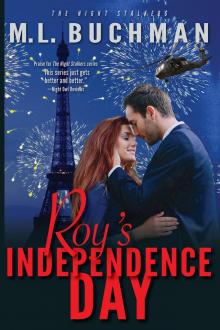 Roy's Independence Day
Roy's Independence Day